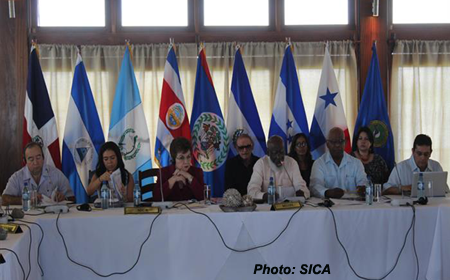PLACENCIA, Stann Creek–Thirteen new bilateral accords between Belize and Guatemala were inked on the Placencia Peninsula on Wednesday, December 17, 2014 – accords which have stirred controversy amid assertions from the Opposition People’s United Party (PUP) that the Barrow administration proceeded with finalizing those undisclosed agreements before consulting with the Belizean people, as had been promised.
As we go to press, the texts of those agreements have not been made public by the Government, and the Opposition is calling for consultations to at least ensure that two more pending agreements which Belize plans to sign with Guatemala are disclosed before signing.
These concerns notwithstanding, the mood at the signing ceremony was celebratory, with all parties—the Government of Belize, the Government of Guatemala and the Organization of American States, the hemispheric organization which has been brokering territorial talks between the two neighboring countries—praising the signing as a milestone.
The Prime Minister of Belize, Dean Barrow called the signing of the agreements “a truly historic moment in the relations between Belize and Guatemala.”
“From energy to culture, tourism to migrant workers, these agreements mark a seminal moment in our relations and bring us a great distance closer to the long overdue settlement of the dispute, and set us firmly on a course to enhance relations, increase goodwill and draw us nearer to that day when we can confine the claim permanently to the ash heap of history,” Prime Minister Barrow said.
He added that, “On a daily basis over 800 Guatemalan children cross from Melchor into Benque Viejo Del Carmen to go to school here in Belize. Side by side, these Guatemalans and Belizean children learn and play, never for a moment concerned about boundaries or claims.”
In speaking at Wednesday’s signing, Otto Perez Molina, President of Guatemala, said that, “Guatemala does not constitute and will never constitute a threat to Belize.” Molina has said the agreements seek to better relations on all fronts between the countries.
Perez Molina was in Placencia, Stann Creek, in southern Belize on Wednesday, December 17, 2014, for the 44th Ordinary Meeting of Heads of State and Governments of the member states of the Central American Integration System (SICA — Sistema de la Integración Centroamericana), which resulted in the Placencia Declaration.
PM Barrow says “tremendous breakthrough,” but the Belizean people don’t know yet exactly what he signed on their behalf
On that occasion, Guatemala assumed the pro-tempore presidency of SICA for January to June 2015, from Belize, the host country for the meeting, which has held the presidency for the last 6 months.
Molina said that the signing of the Belize-Guatemala accords is historically important because they are accords which were the fruit of 10 months of work – something which, he said, is unprecedented.
The first official press release on the signing came from the Opposition People’s United Party (PUP) on Wednesday, when the PUP took issue with the fact that the Barrow administration had signed the agreements with Guatemala before discussing them with Belizeans.
“The representative of the Leader of the Opposition [Senator Lisa Shoman] participated in the bilateral discussion and negotiation of these agreements in early November of 2014 on the clear basis that any agreement signed by Belize with Guatemala first needed to be consulted with the people of Belize prior to any such agreement being signed,” the Opposition said in a statement right after the signing in Placencia.
It added that, “The People’s United Party takes the position that because of the unjust and unfounded claim of Guatemala to Belizean territory, any bilateral agreement between Belize and Guatemala should have been made known to Belizeans and discussed prior being finalized and signed.”
The Opposition then called on the Government of Belize to ensure that the two remaining agreements (those are the agreements on joint exploitation of hydrocarbons and on air transport), and any other bilateral agreement between Belize and Guatemala be fully disclosed to Belizeans for consultation before they are finalized.
The outgoing Secretary-General of the Organization of American States (OAS), José Miguel Insulza, was bestowed on Tuesday with The Order of Distinction by Belize, “in recognition of his diplomatic efforts and support in the advancement of the negotiation process between Belize and Guatemala.”
Insulza said that “for the first time since Independence, the Governments of Belize and Guatemala have taken concrete steps to forge a common destiny…”
Guatemala’s Ministry of Foreign Affairs has published a series of statements on the Belize meeting and the signed accords, which, it notes, covers areas such as tourism, migration, security, customs, economy, education, employment, environment, trade, strengthening diplomatic relations between the countries, and the deportation of undocumented Guatemalans.
The Belize-Guatemala accords were signed in the context of OAS-led efforts to support the adjudication of Guatemala’s unfounded territorial claim over Belizean territory. Guatemala’s report on the signing said that the signing of the 13 agreements (first it said 14 agreements would have been signed) are intended to generate a climate of greater confidence between both countries that would enable them to take the historic territorial differendum, to a referendum and eventually to the International Court of Justice.

According to Pérez Molina, the new agreements come against the backdrop of the 2008 compromís (special agreement) signed just over six years ago in December 2008, in Washington, DC. Following that agreement, the parties had agreed to hold simultaneous national referenda on October 6, 2013.
While Insulza claimed in his remarks at the signing that the referenda could not be held previously “because the countries believed that the conditions did not exist to ensure a successful result at the polls,” Guatemala contends that the reason the referendum was aborted was because it took issue with Belize’s domestic legislation.
Guatemala’s Foreign Ministry’s statement issued Wednesday, December 17, said that the referendum “had been suspended because of changes in Belizean laws.”
Guatemala had unilaterally pulled out of the process, claiming that Belize’s referendum law, which requires that 60% of the electorate participate to make the vote valid, does not create a level playing field to secure a “yes” vote.
This week, Belize’s Foreign Affairs Minister, Wilfred “Sedi” Elrington, is quoted in the Guatemalan press as saying that setting a referendum date is a priority.
Belize is ready for the referendum, and is just waiting for the Government of Guatemala to pick a date, but Belize is totally ready, Elrington told the media.
He added that the 13 bilateral accords signed Wednesday were inked especially so that the people of both countries could see the need for the referendum.
Asked why he believes Guatemala has not yet set a date, Elrington said that Guatemala has more problems than Belize; therefore, they have more to consider, but, he said, he is certain that the Guatemalan government is now in a position to do so, and they are just looking for that “special date.”
According to Insulza, “…today we can affirm that the conditions do exist [for the referenda to be held]; it only remains to set the most appropriate date for the consultations.”
According to Molina, the referenda, which should be held at the same time in both countries, would provide an opportunity for the electorates of both countries to register whether they want what Belize considers to be an unfounded territorial dispute to be submitted to the International Court of Justice (ICJ).
Insulza claimed that the referenda are “demanded by respective legislatures in Belize and Guatemala,” and he added that “one last step is missing” to resolve the dispute between Belize and Guatemala—the national referenda required before the matter can be submitted to the ICJ.
He noted that one year ago, the foreign ministers of both countries traveled to the headquarters of the OAS in Washington, DC, and in Insulza’s presence adopted what he called “a very ambitious ‘Road Map for the Strengthening of Bilateral Relations.’”
“Thanks to the leadership, tenacity, and perseverance of the Joint Commission, headed by Ambassador Alexis Rosado of Belize and the current Foreign Minister of Guatemala, Carlos Raúl Morales, not only was the Road Map complied with, but strong ties of friendship and cooperation were created between the different sectors of Belize and Guatemala,” said the Secretary General.
Amandala readers will recall that Belize and Guatemala signed a Road Map at the headquarters of the Organization of American States (OAS) on Friday, January 24, 2014, setting out a 12-month program of activities which the OAS had said would culminate with a subsequent review to determine the possibility of holding simultaneous referenda in 2015.
The latest agreement does not contemplate that voting would happen in 2014, but it considers the possibility that the ICJ vote may be held in 2015.

